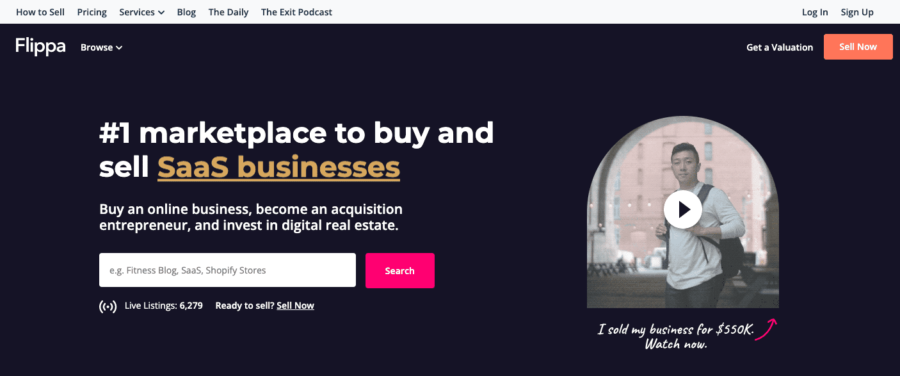Buying blogs can be a great way to make money whether setting up long-term passive income or flipping for a major profit. While this is a very common practice across the Internet, it takes skills, knowledge, and experience to do well.
This article will teach you the best process for buying a blog, how to perform proper due diligence, and walk you through what you can expect from the acquisition process. Let’s begin!
Table of Contents
Why Purchase a Blog? 4 Reasons I Recommend
Investors or other bloggers have several reasons for putting up the money to buy a blog. Here are four of the best reasons that buying an existing site can be a great investment.
1. Passive Income Source
Digital nomads aren’t the only ones chasing passive income. Whether the passive income is used for travel, replacing work income, or put directly into a retirement account for FIRE, buying an already profitable blog is a great way to build passive income from day one.
If a blog is already making steady income but isn’t properly monetized, that can be a great deal. Not only would buying that blog get you passive income from day one, but by optimizing monetization the monthly cash flow goes up.
Which also makes the asset more valuable if you ever do decide to sell.
2. Potential for Bigger Flip Down the Line
Finding blogs with easy wins available to improve traffic and revenue can equal a huge payday. Because a monthly multiplier is part of the website valuation formula, even small improvements in monthly profit can result in major jumps in the total value of the blog.
I’m a huge fan of the big pay-offs that can come from improving an underperforming blog, ramping up the monthly income, and then flipping the site.
3. Grow Your Existing Network of Blogs
Entire niches can gain or lose serious popularity over time. Buying an existing profitable site is a great way to grow a network of blogs by investing in a new niche or space. The instant cash flow can go towards improving the site and growing that network.
The same can be done to dominate one niche. Creating a network of blogs is much easier with a strong acquisitions strategy as opposed to trying to build everything from scratch.
4. Take More Real Estate in Your Niche
Google has 10+ spots on every page of search results, and one site isn’t going to be allowed to take them all. Buying competitors’ sites can allow you to acquire more online real estate in your niche.
Taking up more of the rankings, more page one space, and having multiple smaller brands pointing to your main brand in the niche allows you to take up more and more real estate in your niche while increasing the authority of your main brand at the same time.
Where to Buy a Blog? 3 Ways
Many good options exist for finding quality blogs to buy. Keep in mind that depending on what your goals are (passive income vs flipping, steadiness vs growth potential) that some platforms will work better than others.
1. Private Sale
Many blog owners are willing to sell for the right price but aren’t going to do the work to put their blog up for sale with a broker or marketplace. If you see a blog you would like to acquire, reach out.
This can be especially effective with long-time hobby blogs that aren’t monetized well. If the traffic is there on an older site written by a clear hobbyist, that could be a gem of an acquisition especially if they have strong rankings.
Reach out and see if you get a response. Most won’t respond, but those that do could lead to a great acquisition.
2. Brokers & Marketplaces
The most common option is buying via website brokers and marketplaces. These are online resources that specialize in the buying & selling of websites and online businesses.
There are many great options depending on what you’re looking for, and the following four are some of the best in my experience.
FE International
FE International is one of the truly old-school players when it comes to selling online websites. Touting a 94.1% success rate for selling websites and focusing on sites worth six figures and above, they focus on high-end transactions.
For buyers looking for a steady solid passive income, FE International is an excellent place to look at what’s available.
Quiet Light Brokerage
Quiet Light Brokerage is a name that will be recognized by experienced buyers and sellers alike. They were founded in 2008 by entrepreneurs who have been on both sides of the sale.
That first-hand experience makes for a good buyer/seller experience and attracts some good listings that have potential for investors.
Flippa
Flippa is the Wild West of online marketplaces. This is an open marketplace. There are blogs and websites at all levels of earnings.
This presents major opportunities for finding undervalued blogs that can be improved and flipped, but this also makes due diligence even more important since you’re on your own to confirm all information.
For buyers willing to do the proper due diligence, Flippa holds enormous potential to find very good deals but it does take a lot of work and a lot of searching.
Empire Flippers
Empire Flippers is one of the largest vetted marketplaces to buy or sell online businesses. There are many good blogs, some of which are attached to ecommerce sites or drop shipping operations, many others that are content-based and monetized with ads and affiliate offers.
Empire Flippers has a very good selection of sites at all price ranges increasing the chance of finding a deal that meets your buying criteria.
3. Facebook Groups
Facebook groups can be a great place to find sites for sale. There are multiple Facebook groups you can join that focus on buying and selling sites.
Another excellent strategy, if you know what niche or topic you want to acquire a site in, is to join groups around those topics. You may find some good hobby blogs or websites that the original owners are ready to move on from.
Reach out to them and strike a deal!
Buying an Established Website vs Starter Website
Buying an established website has both pros and cons versus starting a website from scratch or buying a starter site from an agency (which I generally never recommend).
While there are good arguments to be made for both approaches, here are the pros/cons of buying an established website
Pros of Buying
- Cash flow from day one
- An established site has a history, backlinks, traffic, and rankings to build off of
- New content will rank much more quickly thanks to existing site authority
- Easy wins can quickly increase the value of the bought asset for a huge profit flipping the website
- Saves time
Cons of Buying
- Much more expensive than building a blog on your own
- If the site loses rankings/traffic you could lose your investment
- Huge time/work commitment
- No guarantee of success: more risk
Your own goals, interests, skill level, and budget will help determine which route is the right one for you.
9 Due Diligence Tips When Buying a Blog
Due diligence is a crucial step in buying a blog. I never skip this all-important step and will walk away from a potentially good deal if I don’t have the time or information necessary for proper pre-sale due diligence.
I’m looking for an excuse to not buy the site. If a red flag comes up, I walk away and look for another deal.
1. Make Sure Traffic & Income Reports Check Out
A common Flippa scam is having fake traffic screenshots or photoshopped income reports. Make sure to confirm the numbers that are being shown to you.
2. Traffic Trends
Is the traffic stable, growing, or declining? Short-term bursts of traffic need to be treated with caution while major drops that started around the time of a Google Algorithm update.
Look at the long-term traffic trends to make sure the site isn’t in a losing niche where interest in the topic has been waning for years.
3. Branded Domain
Is the URL brandable or does it sound like a niche site? Does it sound spammy? Branding matters, and ideally the domain has a solid or at least adequate branding potential.
4. Domain Age
History matters a lot to search engines. An old domain name with a good history is valuable. I want to know how long the current site has been on the domain name, and I want to make sure there were no “bad neighborhoods” attached to this name in the past by using the Internet Archive Tool.
5. Check the Important SEO Metrics
Look at backlinks, site authority, site speed, Core Web Vitals, the quality of the content on the average article – anything that is widely accepted as affecting the SEO of a website.
These are important to locate easy wins, spot potential red flags, and see what needs serious work.
6. Domain Quality
I only want domains with a good TLD like .com, .co, .io. Domains with a good TLD should be short, easy to remember, easy to spell, and easy to brand. A quality domain name makes a big difference in the long-term building of a good blog.
7. Toxic Links
Toxic links are a huge red flag. These could indicate PBN use, black hat SEO from questionable sources, past hacking incidents, or indicate a history of when the domain had a “bad neighborhood” website on it.
8. Existing Penalties
If a site is penalized that is a very bad sign. Why was it penalized, what updates affected it, and why haven’t they been fixed? Some sites recover from major Google updates but some never do.
9. Monthly Costs
The monthly costs for maintaining the site matter. What are gross profits vs net profits? If a lot of maintenance is going into a site that is designed to be self-sufficient, that’s a red flag.
How Does the Acquisition Process Work?
While possibly intimidating for a first-timer, it doesn’t take long to get used to the process with enough transactions.
Here’s how the acquisition process works for buying a blog:
- Make contact with interested parties.
- Perform due diligence. Even if going through a broker with vetting, you should still perform your own due diligence to confirm everything.
- Negotiate & agree upon price.
- Create a legal contract for the transaction.
- Set up escrow.
- Put money in escrow.
- Begin the transfer process, aiding on the technical side of things if necessary.
- Once the domain is transferred, set up your own hosting and upload content.
- Once satisfied, release the money from escrow.
- Improve and build on your new website as you see fit.
Frequently Asked Questions
Here are some of the most important, and most common, questions around how to buy a blog.
Buying a blog can definitely be worth it, but it’s crucial to do proper due diligence to make sure the blog looks solid, meets your specific criteria, and ideally still has plenty of room to grow.
As mentioned earlier Flippa, Empire Flippers, FE International, and Quiet Light Brokerage are some of the best. Facebook groups can be a great option, but there are many other great sites like Motion Invest or Investors Club depending on your goals and what type of blogs you’re looking for.
This comes down to skills, budget, and time. Do you have the skills to build and grow a profitable blog? If not, then you need to build to learn those skills before buying an existing site.
If you have the skills then it’s all about money vs time. If time is more valuable, buying is a great way to get an established site that is already returning cash flow as you work to further improve it.
If money is tight then start a blog and build it up using your time.
Wrapping Up
Learning how to buy a blog takes some time, but with the guidance from this article and practice performing due diligence, the process gets more familiar and smoother. This is a process that has steps, but it’s easy to learn and repeat.
Enough practice and you will soon be able to do due diligence and buy blogs like a pro!






